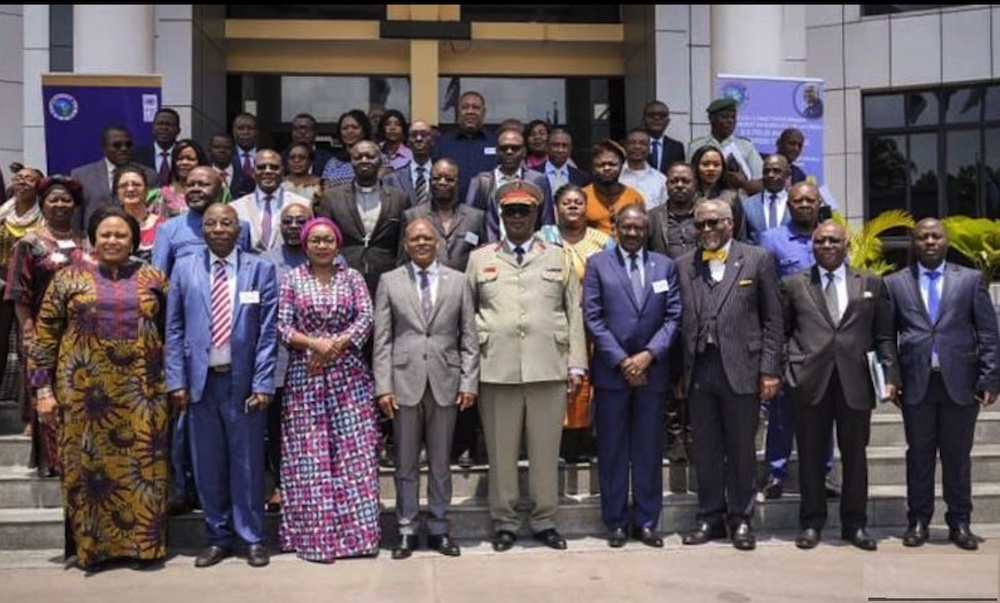. SUSTAINABLE DEVELOPMENT . .
An article from Digital Congo
The College of Advanced Studies in Strategy and Defense (CHESD) has been hosting since Friday, October 14, 2022, the biennial of the Economic Commission of Central African States (ECCAS) for a culture of peace.

Placed under the theme: “APSA@20: challenges and prospects for silencing the guns in Central Africa: Retrospection and prospective analysis”, this conference is organized in partnership with the Government of the DRC, the United Nations Development Program ( UNDP) and with the support of CHESD led by Major General Augustin MUBIAYI MAMBA, the African Center for the Constructive Resolution of Conflicts (ACCORD), the Institute for Security Studies (ISS), UNESCO, the ‘OIF, CICIBA, CERDOTOLA.
It also provides an opportunity for participants to reflect on better coordination of efforts at continental, regional and local level for the realization of the African Union’s Agenda 2063 on democracy, good governance, and a peaceful and secure Africa. .
In her speech, the Resident Representative ai of the UNDP, Mrs. Rokya Ye NDIENG indicated that:
“The theme of this conference, namely ‘Culture of Peace’ presents three essential opportunities to participants. First, it is the opportunity to assess existing approaches, tools and systems for conflict management at all levels, then, the need to propose concrete recommendations to improve strategies for strengthening peace and security and finally, the imperative to formulate a roadmap to “Silencing the guns” by 2031, in Central Africa (…)”.
(article continued in right column)
Can the African Union help bring a culture of peace to Africa?
(article continued from left column)
She continued: “The dynamics of conflicts on the continent have changed in recent years. New threats have emerged, such as climate change, pandemics and cybersecurity. They require adapted, coherent and concerted responses. these conflicts have also evolved and their modi operandi have changed, such as pirates, terrorists and criminal organizations (…)”
“(…) the African peace and security architecture created by the African Union in collaboration with the Regional Economic Communities must respond to these challenges which are becoming increasingly complex in order to prevent, manage and resolve conflicts on the continent (…) the UNDP supports the strategic vision of the African Union declined through the 2063 Agenda for a prosperous and peaceful Africa.
This vision contributes to the achievement of Sustainable Development Goal (SDG) 16 aimed at “promoting the advent of peaceful and inclusive societies for the purposes of sustainable development, ensuring access to justice for all and establishing, at all levels, effective, accountable and open institutions (…) there can be no sustainable development without peace and stability. The prevention and peaceful resolution of conflicts are therefore necessary conditions for the achievement of the Sustainable Development Goals. Sustainable Development, particularly in the context of the Central African sub-region marked by political, economic, social and security fragilities (…)”, she specified.
Additionally: “(…) a holistic approach to conflict prevention is essential if we want to build and root a culture of peace on the continent and more particularly in Central Africa. Building peace through building inclusive, peaceful and resilient societies presupposes the establishment of functional conflict prevention and resolution mechanisms at all levels with a view to strengthening the African peace and security architecture. youth to continental, regional, national and local peace efforts is an imperative (…)”
In addition, the President of the Commission, Gilberto da Piedade Verissimo, for his part, welcomed the holding of these meetings which is in line with finding a lasting peace in Central Africa.
It should be noted that this first biennial, the closing of which takes place this Saturday, October 15, 2022, brings together high-level participants from the region and around the world, youth and women’s groups, civil society organizations, NGOs and Representatives of various United Nations entities.